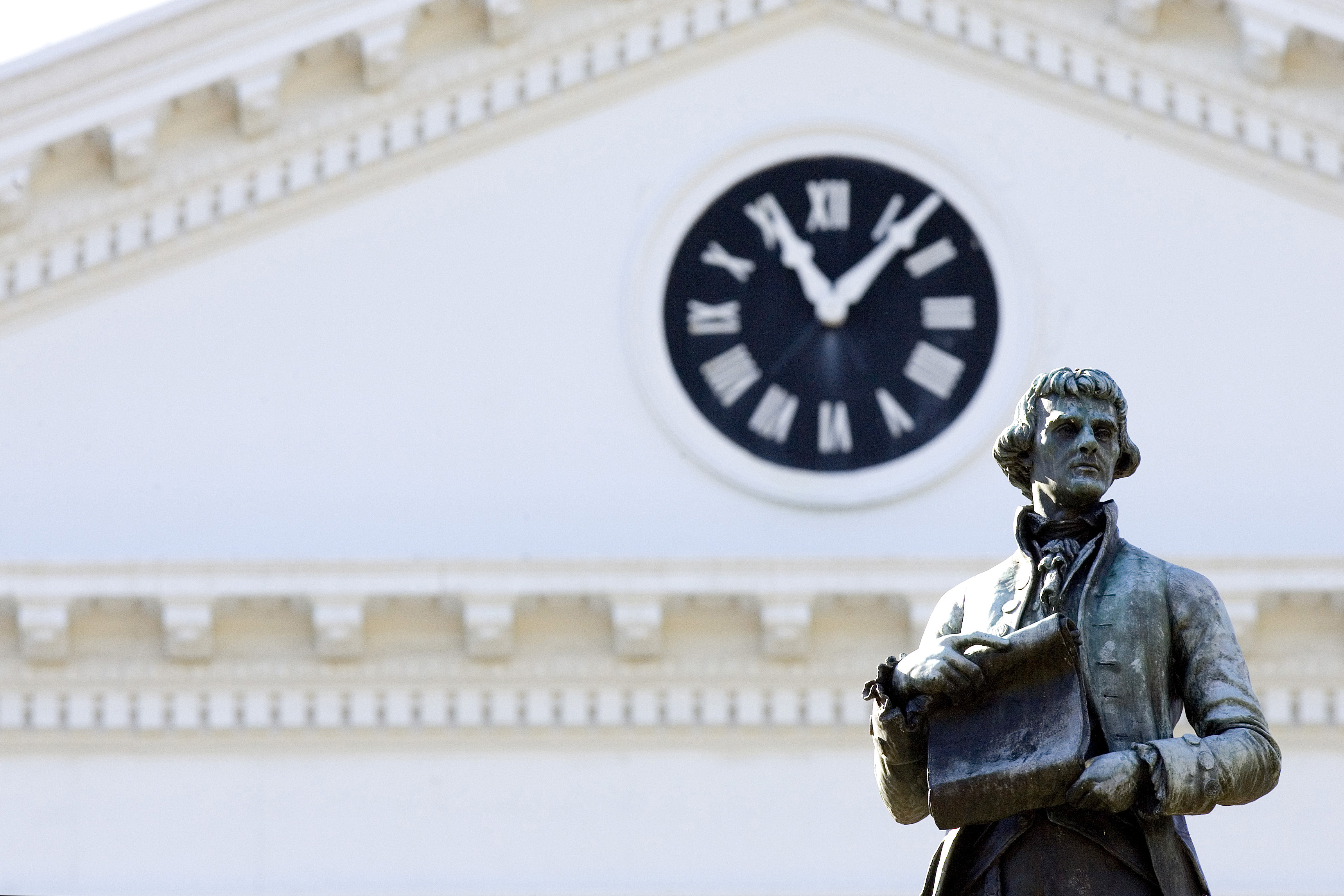Two University of Virginia professors on Thursday headlined a panel discussion about the forced resignation and reinstatement of President Teresa A. Sullivan, and the topics that surfaced – as well as those that did not – over the tumultuous past three weeks.
James W. Ceaser, Harry F. Byrd Professor of Politics in the College of Arts & Sciences, and David Breneman, Newton & Rita Meyers Professor of the Economics of Education and former dean of the Curry School of Education, offered their views on how U.Va. events reflect the challenges most higher education institutions face.
The Hudson Institute in Washington, D.C., a nonpartisan, independent policy research organization, hosted the discussion, "What Would Jefferson Do?: U.Va. and the Crisis of Liberal Education," and streamed it online. Moderated by Hudson Institute senior fellow William Schambra, the panel also included Michael Poliakoff, policy director at the American Council of Trustees and Alumni, an independent, non-profit organization that works with alumni, donors, trustees and education leaders on academic matters.
Ceaser, on the U.Va. faculty since 1976, wrote a commentary that appeared June 22 in the Washington Post, "What would Thomas Jefferson think of the U.Va. turmoil?" The article provided the context for discussing wider concerns in liberal education, along with another, "The University of Virginia — ground zero for change," written by Anne D. Neal, president of the American Council of Trustees and Alumni, which appeared June 23 in the Washington Post.
"It's a classic governance tale ... of wrestling over the soul of the University," Breneman said.
The unfolding of events was distinctive, however. "We were witnessing something so unprecedented and so unusual. Not one human being – except for those Board of Visitors members – saw this coming, to have the president toppled," he said.
He described the initial reactions from the U.Va. community as "adversarial," and said he was glad to see how the tone became conciliatory by the time of Sullivan's reinstatement.
Breneman acknowledged that he has been close to Sullivan's leadership: He chaired the search committee that resulted in last year's hiring of John Simon as executive vice president and provost, and he participated in a National Research Council group headed by Sullivan that reported in late Mayon ideas for measuring institutional quality.
Having been president of Kalamazoo College from 1983 to 1989, before coming to U.Va., Breneman said no president can effect big changes at a college or university in 22 months, the length of time Sullivan has been at U.Va. It'll take more than five years, he said.
He emphasized the importance of Sullivan's major initiative: revising and changing U.Va.'s budget structure, which he called "dramatic," and which is still in transition. When he was the education dean from 1995 to 2007, he had no incentives to be more involved in budget decisions, except by trying to raise private money, he said.
Breneman and Ceaser agreed that Jefferson would not have viewed the board's decision as being made legitimately and would have completely endorsed the U.Va. community's reaction.
Ceaser said if the board members were trying to be bold, they botched the decision-making process. Hiring a new president would've set the University back at least two years, he said.
What dismayed Ceaser was the lack of emphasis on liberal education in any of the views and memos from the board or Sullivan, he said.
A self-described "academic conservative," Ceaser said the U.Va. situation has vexed and divided those in the same camp, and not because Sullivan stands for what conservatives stand for. He said the board's actions violated the traditional code of conduct, an ethos that makes the University "special."
"The Board of Visitors seems indifferent to the things I think are important – education in the liberal arts to become a good citizen, a good person," Ceaser said.
He called the arts and sciences curriculum at U.Va. and other institutions "a travesty," agreeing with the third speaker, Poliakoff, about the need for a more rigorous general curriculum.
The American Council of Trustees' Poliakoff supported the U.Va. board's right to take decisive action to remove Sullivan, but said its process was "deplorable." He commended the reconciliation between her and the board.
He called for a review of accountability and assessing what students learn and of faculty teaching loads (which he said should be increased). The University should pursue innovative ways to make the liberal arts curriculum sustainable, perhaps sharing the teaching of under-enrolled subjects among schools and increasing use of classrooms and laboratories.
All three panelists agreed on one of Ceaser's observations in his Washington Post article: "There are financial bottom lines, and then there are academic ones."
– by Anne Bromley
Media Contact
Article Information
June 29, 2012
/content/uva-scholars-discuss-liberal-education-light-recent-events

